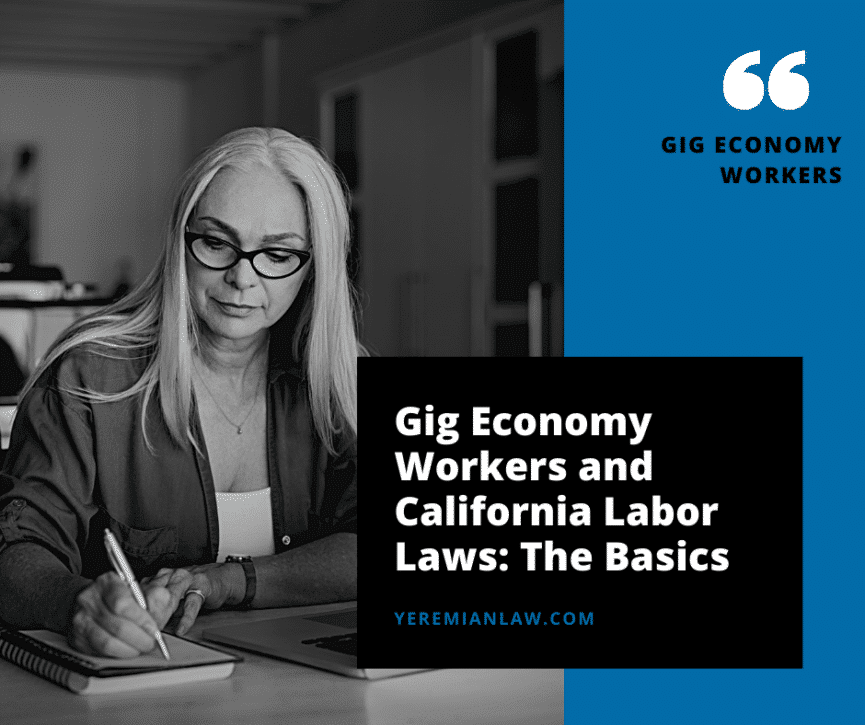Gig economy workers – people whose income consists of income-earning activities that exist outside an employer-employee relationship – aren’t entitled to the same California labor law protections as many employees are.
So what protections do gig economy workers have in California? Here’s what you need to know.
Gig Economy Workers and California Labor Laws
 California labor laws are designed to protect nonexempt employees. That excludes gig workers and those who primarily perform executive, administrative or professional duties, as well as those who regularly and customarily exercise discretion and independent judgment at work, earning a salary equivalent to two times the state minimum wage.
California labor laws are designed to protect nonexempt employees. That excludes gig workers and those who primarily perform executive, administrative or professional duties, as well as those who regularly and customarily exercise discretion and independent judgment at work, earning a salary equivalent to two times the state minimum wage.
Gig economy workers are generally independent contractors, earning per-project rates. The gig economy is growing rapidly, and it often relies on workers using tech platforms like Fiverr, Upwork and others to find jobs. While this can be helpful to workers who need to earn cash, these types of arrangements provide very little protection under California labor laws – with an exception: harassment.
Harassment and Gig Economy Workers
Being an independent contractor doesn’t preclude someone from being harassed, and California labor laws do provide some protections for gig economy workers. The Fair Employment and Housing Act, or FEHA, protects independent contractors from harassment in the workplace.
Related: Independent contractor wage and hour claims
The Differences Between Gig Economy Workers and Employees
 Often, employers misclassify employees and consider them independent contractors when they really should be considered employees. Employers do this for a variety of reasons. Sometimes it’s an honest mistake – it can be difficult to tell whether someone is an independent contractor or an employee – but in many cases, it’s not an honest mistake at all. Employers may misclassify an employee to avoid paying benefits or to keep a worker from enjoying the protections that California’s employment law provides.
Often, employers misclassify employees and consider them independent contractors when they really should be considered employees. Employers do this for a variety of reasons. Sometimes it’s an honest mistake – it can be difficult to tell whether someone is an independent contractor or an employee – but in many cases, it’s not an honest mistake at all. Employers may misclassify an employee to avoid paying benefits or to keep a worker from enjoying the protections that California’s employment law provides.
Related: The ABC test for independent contractors
It can be difficult to mistake a gig economy worker for an employee, though, because many workers in this situation are paid on a per-project basis.
In cases like these, an attorney would look at whether the victim is actually an employee or an independent contractor. Use the table below to determine whether you may be misclassified as an independent contractor.
|
Employee |
Gig Economy Worker/Independent Contractor |
| Usually works for one employer | Can work for multiple employers at once |
| Works at certain times with hours set by employer | Sets own hours |
| Usually works in the employer’s location | Can work from any location |
| Performs work under the employer’s control | Often or usually works independently |
| Follows employer’s guidelines on completing tasks | Can perform tasks in any way, without employer’s input or direction |
| Does not spend personal money on the job | Spends personal money on things related to completing the job |
| Employer withholds taxes | Pays own taxes |
| Eligible for unemployment benefits in most cases | Ineligible for unemployment benefits |
| Can claim worker’s compensation | Cannot claim worker’s compensation |
| Receives at least minimum wage | Receives pay according to terms and conditions of a contract |
| Is covered by California and federal labor laws | Is usually not protected by California labor laws (except when it comes to harassment) |
These are big differences – and often, it’s easy to tell whether someone is a gig worker or an employee simply based on how the person is paid, whether the employer takes out taxes or the worker pays them on his or her own, and whether the worker completes work with or without direction from the employer.
What if You’re Misclassified?
If you’re misclassified as an independent contractor, or if it’s not really clear whether you’re a gig worker or an employee, you may want to talk to an attorney about your situation. Misclassified employees are often entitled to financial compensation for the things they’ve missed out on – like benefits – as a result of the misclassification.
Call us at 818-230-8380 or fill out the form below to tell us about your situation. We’ll answer your questions, ask you some of our own, and help you determine the best path forward.




